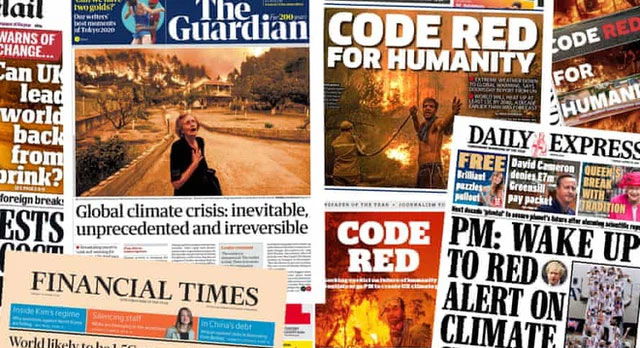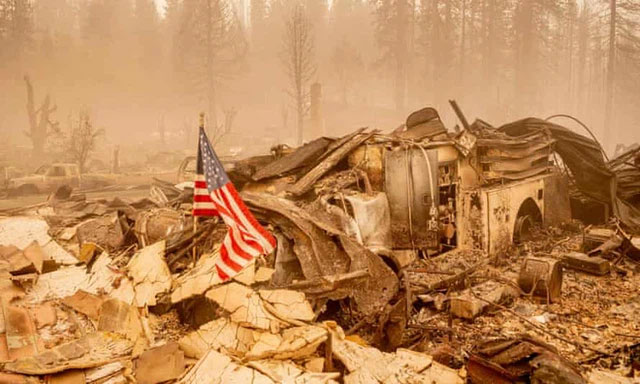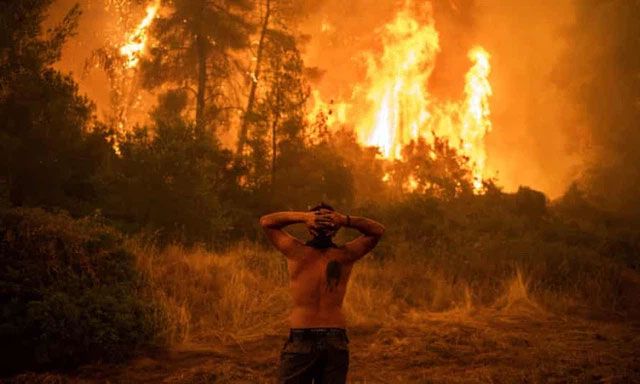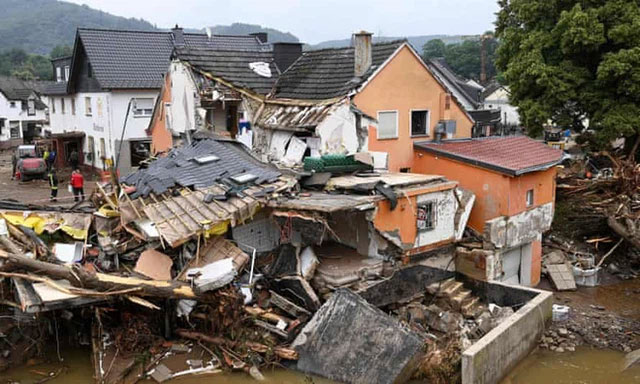On August 10, 2021, the front pages of several newspapers in the UK and the US featured an image of an elderly woman in pain, helpless in the face of an unprecedented wildfire on Evia Island in Greece. This image encapsulated the global feelings of suffering and fear of humanity in the face of nature’s wrath.
The Guardian, Financial Times, Daily Mail, Daily Telegraph (UK), and New York Times, CNN, Washington Post (US) all reported simultaneously to express the urgent concerns of our time.

The front page of several newspapers in the UK and the US featured an image of an elderly woman in pain, helpless in the face of an unprecedented wildfire on Evia Island in Greece. (Source: The Guardian).
The headline of The Guardian read “Global Climate Crisis: Unavoidable, Unprecedented, and Irreversible”; “Look, Prime Minister: Wake Up to the Red Alert on the Climate Crisis” was the title on the front page of Daily Express; “Apocalyptic Report Warns of Climate Change: Can the UK Lead the World Back from the Brink?” – asked Daily Mail.
“The story of climate change has appeared across the front pages of many newspapers in the UK and the US… We must act, we must change. That is the most important thing humanity needs to do in the next 30 years. It will change our lives, it will change how we relate to ourselves on this planet. And if we do not do this, we will create major problems for our children,” said Professor Martin Siegert from Imperial College London.
Following a report compiled from 14,000 scientific data points, released on August 9, 2021, the Intergovernmental Panel on Climate Change (IPCC) of the United Nations made it clear: We must take urgent action to limit global warming and prevent disasters from climate change.
Will our policymakers and the COP26 conference (taking place in November 2021) fulfill this task?
Humanity Ignoring Prophecies/Warnings
At the end of the classic 1960s science fiction film titled “The Day the Earth Caught Fire” (1961), the camera panned around the Daily Express newsroom to a front-page headline hanging on the wall that read “Earth Saved” next to “Earth Doomed.” And then the screen went dark!
The film ends without revealing the fate of our planet because, during that decade, the Earth’s rotation was thrown out of control by simultaneous atomic bomb tests by the Soviet Union and the US in the bloodless conflict known as the Cold War (1946-1991).
“The Day the Earth Caught Fire” of the 1960s is indeed a prophecy about the future of the Earth. Because exactly 60 years later (as of 2021), the whole world is grappling with the battle against climate change and global warming. The UN’s IPCC has had to issue a “red code” warning for humanity – the highest level of alert!
UN Secretary-General António Guterres expressed concern: “The alarm bells are ringing loudly, and the evidence is undeniable: Greenhouse gas emissions from burning fossil fuels and deforestation are suffocating our planet; putting billions of people in immediate danger!” He called the IPCC report a “red code for humanity.”
Clear evidence shows that greenhouse gas emissions are driving us toward a fiery, disastrous future caused by severe climate change. Only urgent reductions in fossil fuel emissions can hope to save humanity and countless species on Earth.
Professor Tim Palmer from the University of Oxford stated: “Our climate in the future could become a kind of hell on Earth.”
Or, as Professor Dave Reay, Executive Director of the Climate Change Institute at the University of Edinburgh (Scotland, UK), said: “The IPCC report is not just a scientific report. It is a charge sheet of a hellish reality and rising waters.”
Certainly, the figures presented in the IPCC report released on August 9, 2021, are clearer and more cautious than previous reports from the UN agency. As clearly stated, humanity has pumped about 2.4 trillion tons of carbon dioxide (CO2) into the atmosphere since 1850, creating the highest levels of emissions seen on Earth in the last 2 million years.
Heatwaves and heavy rainfall leading to floods have become more intense and frequent since the 1950s in most parts of the world, and climate change is currently affecting all inhabited areas of the planet.

A fire truck and fire station burning in downtown Greenville, California, on August 7. The Dixie Fire has ravaged an area larger than Los Angeles. (Photo: Josh Edelson / AFP / Getty Images)
Drought is increasing in many areas, and more than 66% of the number of hurricanes and major storms has risen since the 1970s.
Specifically regarding drought, this is a looming global crisis that could become the “next pandemic” if governments do not act.
“Drought is on track to become the next pandemic, and there is no vaccine to cure it. Most of the world will have to live with water stress for many years to come,” warned Mami Mizutori, the UN Secretary-General’s Special Representative for Disaster Risk Reduction.
According to previous UN reports, at least 1.5 billion people worldwide have been affected by drought in the past two decades, causing economic losses of over $124 billion.
Professor Corinne Le Quéré from the University of East Anglia (UK) stated: “If we still need evidence to prove that climate changes are caused by human activities, this report provides that.”
In a heartfelt letter sent to the 14th President of the United States, Franklin Pierce (1804-1869), by Native American leader Noah Seattle (1786-1866) in 1855, it stated: “Always remember: The Earth does not belong to man. Man belongs to the Earth. Man did not create this nest; man is merely a thread in it. Once we negatively impact that nest, we will have to face the consequences.”
What will happen when once peaceful corners of the forest suddenly smell of humanity? Or when the golden hills of poetry are tainted by wireless lines? What will happen to the forests? They will disappear! Where will the woodpeckers go? They will vanish!… Everything will eventually disappear!
What remains after the terrible things happen to those small beings? Nothing but the end of precious “living” days and the beginning of a long struggle for “survival”…
The heartfelt letter filled with sacred emotions from a son to Mother Earth, written by the Native American tribal leader Noah Seattle 166 years ago, still resonates today. The lesson “Humanity cannot be separated from Nature” seems to hold true across all eras and historical stages.
Things Can Only Get Worse…
Let’s return to the 21st century.
The consequences of humanity’s massive atmospheric interventions are now clear: What is hot today will become hotter tomorrow; extreme flooding will occur more frequently, forest fires will become more dangerous, and deadly droughts will spread further. In short, things can only get worse.
Indeed, by the end of this century, these [climate change consequences] could pose a threat to civilization if emissions continue to be released into the atmosphere at the current rate.
Professor Jonathan Bamber from the University of Bristol (UK), a co-author of another report, added: “This may seem far off for today’s adults – but there are millions of children born who should be living healthy, thriving lives in the 22nd century.”
In fact, the Earth could become extremely catastrophic when world-altering events occur – such as forests dying across continents or icebergs collapsing in Antarctica; rising sea levels…

A helpless man in front of a forest fire on Evia Island, Greece, as the region endures its worst heatwave in decades, which experts say is linked to the climate crisis. (Photo: Angelos Tzortzinis / AFP / Getty Images)
“It is necessary to further discuss the IPCC report. It has provided a comprehensive update on climate change. It includes events “low-probability – high-impact” [such as significant changes in ocean circulation] that are also likely to be affected in a warmer world. These “known unknowns” are much scarier [than the known extreme weather phenomena].” – Professor Andrew Watson from the University of Edinburgh (Scotland, UK) stated.
The IPCC report bluntly acknowledges: Climate change is causing a series of extreme weather phenomena such as floods, droughts, wildfires, ice melting, and heatwaves. A variety of human activities (from production, business, transportation, daily life…) are the main causes of climate change/global warming.
Since the first IPCC climate assessment report in 1990, the report released on August 9, 2021, is a distinct indictment that is uncompromising and unavoidably clear. The reality in the report is so evident that not only Earth scientists recognize it but also government representatives in the committee agree and are convinced of the urgency of the Earth’s situation.
Lord Deben, Chairman of the UK Climate Change Committee, stated: “Government representatives in the IPCC also see the direct link between greenhouse gas emissions and recent wildfires, floods, and extreme weather phenomena, and that compels their governments to take action.”
COP26
At the climate meeting in Paris (France) in 2015, governments (from the IPCC committee) committed to striving to keep temperature increases below 2 degrees Celsius and ideally not exceeding 1.5 degrees Celsius. The current issue is that the world has warmed by nearly 1.1 degrees Celsius, meaning only significant reductions in emissions can prevent global warming from worsening significantly.
Among the five greenhouse gas emission scenarios, the most ambitious scenario described by the IPCC indicates that we have less than a 50% chance of staying below that 1.5 degrees Celsius threshold.
These issues will be dissected at COP26 – the United Nations Climate Change Conference to be held in Glasgow (Scotland, UK) in November 2021.
However, countries will need significant and sustained efforts to maintain their greenhouse gas reduction efforts and keep the Earth from warming more than that 1.5 degrees Celsius threshold.

Floods caused significant damage in Schuld, near Bad Neuenahr-Ahrweiler, western Germany, in July, resulting in 189 fatalities. (Photo: Christof Stache / AFP / Getty Images)
It is estimated that climate investment equivalent to 1% of the UK’s GDP is necessary to ensure the country transitions to a carbon-neutral state. However, the UK is currently spending about 0.01%… which is one-hundredth of that estimate.
This figure is also much lower than the amount the UK government is spending on things that will actually increase our emissions, such as plans to expand airports and the tens of billions they have committed to new road programs – which will only make it easier for commuters to drive and burn more fossil fuels.
These are all issues that the UK must address as an urgent matter in the coming months, even though the opening of the COP26 conference in Glasgow (Scotland, UK) will be an even more pressing event.
At the meeting, starting on November 1, 2021, delegates from over 190 countries will gather to reach an agreement defining the extent of global warming. In Paris, in 2015, nations committed to reducing emissions, which now urgently need to be updated, or the global temperature will rise above 2 degrees Celsius.
Similarly, agreements must be reached on how to phase out coal-fired power plants as quickly as possible, to protect carbon dioxide (CO2) absorbing forests; while also gaining consensus from wealthier nations to agree to aid developing and poorer nations to help them survive the impacts of global warming.
In this way, we will know more or less what the fate of the planet will be in November 2021, exactly 60 years after the film “The Day the Earth Caught Fire” was released. Whether the Earth will “Earth Saved” or “Earth Doomed” – it all depends on our decisive actions!



















































